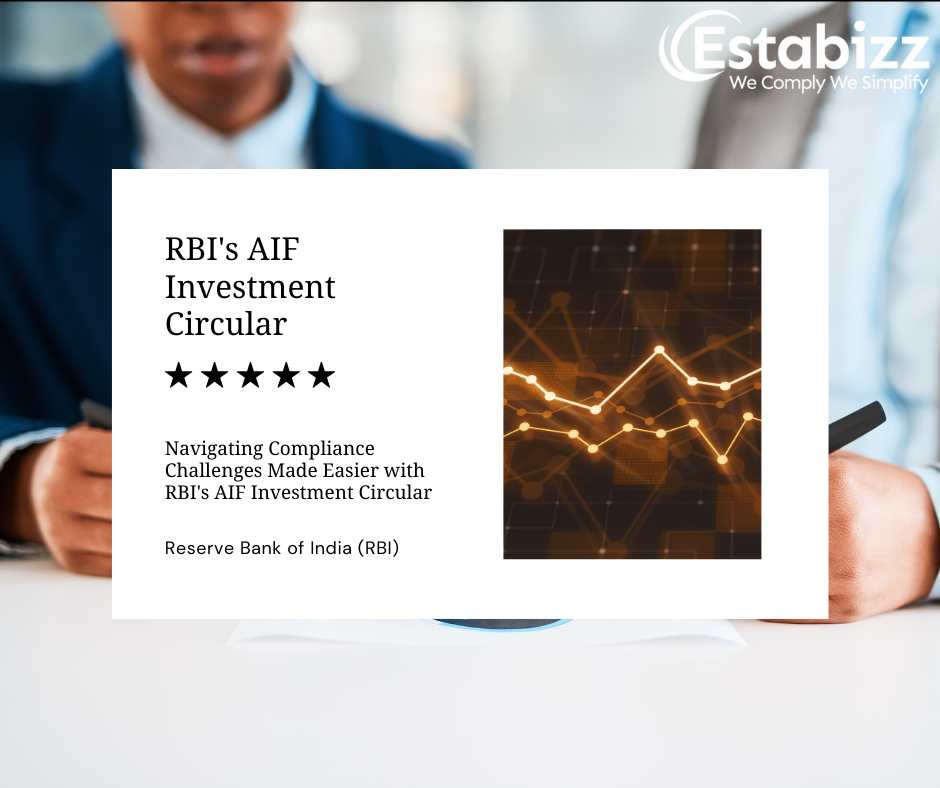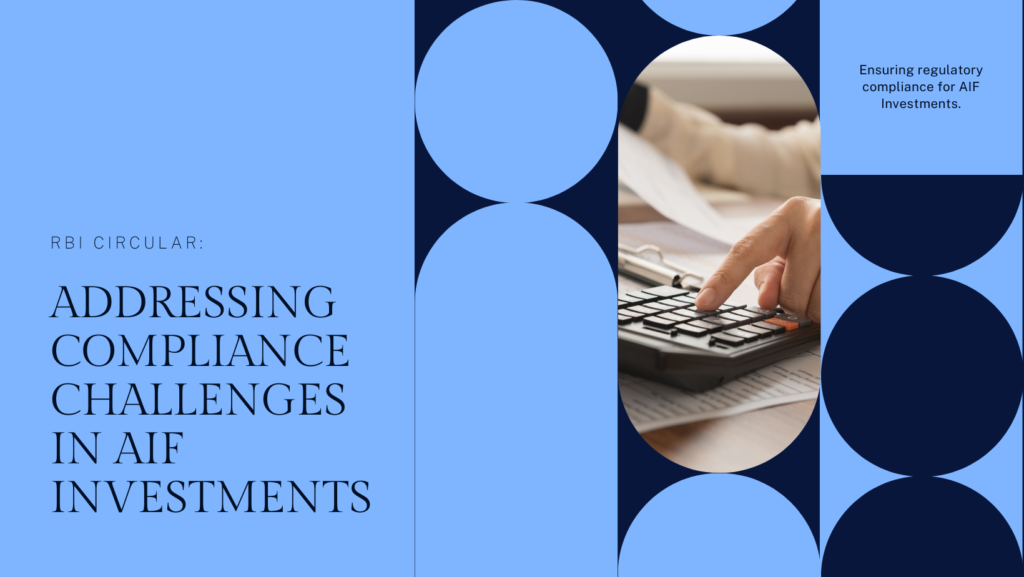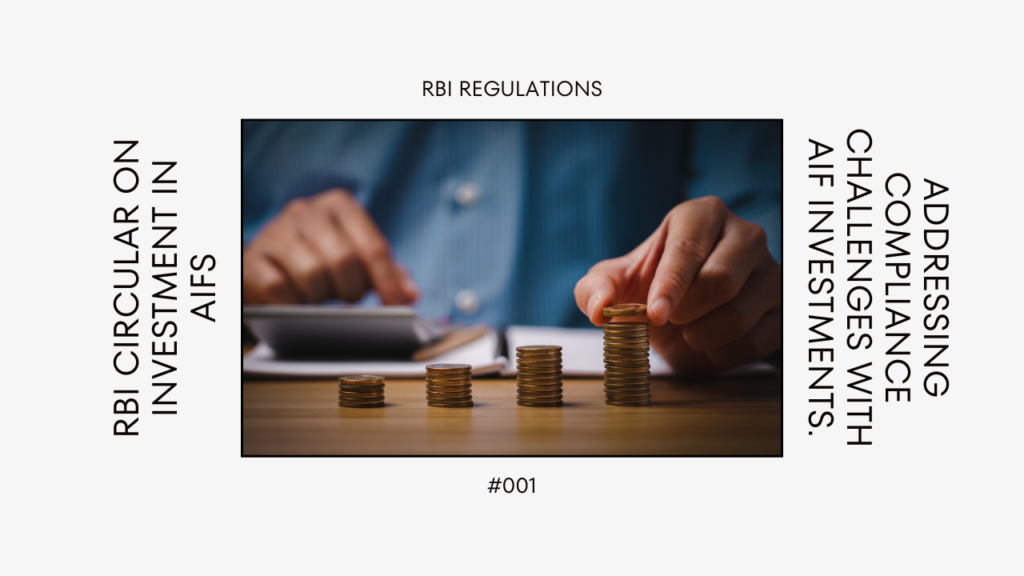RBI’s Circular on Investment in AIFs: Addressing Compliance Challenges
The Reserve Bank of India (RBI) recently issued a circular that could pose both practical challenges and concerns regarding compliance for regulated entities (REs) engaging in investments in Alternative Investment Funds (AIFs).
RBI’s Intent: Managi

AIF COMPLIANCE
ng “Evergreening” Concerns
RBI’s concerns surrounding the practices of loan “evergreening” by REs, including Non-Banking Financial Companies (NBFCs), are indeed justified. The circular is specifically designed to restrict structures permitting REs to continually renew or rollover low-quality loans—termed as “evergreening.”
This evergreening practice involves REs investing in AIFs, which further invest in non-convertible debentures (NCDs) of a company that the RE has loaned to earlier. The debtor company can then employ funds acquired from the NCDs to repay overdue loans. Although this shows in the RE’s books as repayment of the overdue debt, the indirect exposure through investments in the AIF continues, shielding the debtor company from any negative impact on its creditworthiness.
New Directive of the RBI Circular
In its circular, RBI steers clear of encouraging such practices. It does so by prohibiting REs from investing in units of AIFs carrying downstream investments, whether direct or indirect, in a company to which the RE currently or previously within preceding 12 months had loan or investment exposure—now defined as a ‘debtor company.’
Mandatory Liquidation: A Double-Edged Sword
Furthermore, the circular requires REs that have already invested in such AIFs to liquidate their investment within 30 days of the downstream investment by the AIF or the circular’s date in case of existing investments.
If the REs fail to liquidate as per the aforementioned requirements, RBI mandates them to make 100% provision on such investments. However, this aspect of the circular may pose practical difficulties: the requirement of prompt liquidation could cause discomfort to REs acting in good faith.

AIF COMPLIANCE
The Unforeseen Implications of the Circular
While the circular addresses potential evergreening structures constructively, implementing a blanket prohibition on investments in units of AIFs with downstream investments in debtor companies of REs might lead to unintended consequences.
Erroneous classification of all AIF investments (including ones in financially stable organizations) as attempts at ‘evergreening’ could potentially occur. The stringent rules may also dissuade REs from investing in AIFs due to increased requirements for rigorous due diligence and strengthened internal controls to ensure compliance with the circular. Consequently, it might also unfairly disadvantage domestic institutional capital in comparison with foreign institutional investors.
Navigating Potential Challenges
While complying with the circular, REs may encounter numerous practical challenges. AIFs making NCD investments are typically close-ended Category 1/2 AIFs, meaning such AIFs won’t be able to redeem their units easily because their underlying investments are illiquid. Also, the transfer of such AIF units requiring investment manager consent and subject to certain lock-in restrictions makes liquidation within the prescribed time challenging.
Another obstacle could be finding new buyers for the AIF units. Prospective buyers might be wary of purchasing from REs due to the circular’s implications.
In addition, if REs function as a sponsor to such AIFs, they would need to identify another sponsor to liquidate their AIF investments, a process requiring prior approval from the Securities Exchange Board of India (SEBI). According to SEBI AIF regulations, sponsors must continuously retain interest in the AIF throughout its tenure.

AIF COMPLIANCE
A Need for Clarification
Given these challenges, some clarifications from RBI could ease the concerns of both the REs and the AIF industry.
In conclusion, while the RBI’s concerns about preventing evergreening are valid, the current form of the circular may cause discomfort to genuine REs, aside from posing several practical issues. Therefore, it is necessary that the RBI issues additional clarifications, ensuring the circular is not just reparative but also conducive to the continuous growth and stability of the financial sector in India.
Unraveling Specific Challenges in Complying with RBI’s Circular
Broadly, the challenges arising from RBI’s circular on AIF investments for regulated entities (REs) can be categorized into three main areas: investment liquidation, potential loss of buyers, and the situation of sponsor REs.
Investment Liquidation: A Practical Hurdle for REs
RBI’s instruction for REs to liquidate their investments in AIFs within 30 days could pose significant difficulties. As we mentioned before, AIFs engaged in NCD investments are usually Category 1/2 AIFs, which are close-ended. As a result, these AIFs will not be able to redeem their units readily due to their underlying investments’ illiquid nature. The transfer of such AIF units would require an investment manager’s consent and is subject to certain lock-in restrictions. Complying with the directive to liquidate the investment in AIF units within the prescribed time could prove challenging given these constraints.
Mitigating the Loss of Potential Investors
Another aspect of the challenge is the potential reluctance on the part of prospective buyers to invest. After the release of the RBI circular, potential buyers are likely to exercise greater caution before purchasing the AIF units from the REs. They would want to avoid possible non-compliance with the circular, which could result in stringent penalties. As such, a decrease in potential investors would pose a significant hurdle for the REs aiming to liquidate their investments in AIFs.
Implications for REs acting as AIF Sponsors
In situations where REs act as sponsors to AIFs, finding another sponsor becomes a priority when liquidating their investment. However, this process isn’t straightforward—it requires prior approval from the Securities Exchange Board of India (SEBI). According to SEBI AIF regulations, sponsors should maintain a consistent interest in the AIF throughout its tenure. This requirement makes it tough for REs to just simply withdraw their investment without causing disruptions to the AIFs they sponsor.
Revisiting RBI’s Stance
Considering these challenges, it seems pertinent for RBI to reconsider its stance and provide further clarifications. While aiming to address the problem of evergreening, the implications of RBI’s current circular also shadow onto the legitimate, non-evergreening transactions of REs. The need of the hour is an elaborative guideline; one that could distinguish an authentic transaction from an evergreening attempt.
For a balanced regulatory landscape, RBI might need to fine-tune the circular to ensure it negates the problem of evergreening without causing discomfort to genuine transactions by the REs.
Drawing Conclusions
To sum up, while the RBI’s direction on AIF investments aims to prevent questionable loan practices, its current form raises some practical challenges that may produce undesirable consequences. These mainly include issues with immediate liquidation requirements, potential loss of investors, and complications for REs acting as AIF sponsors.
Given these implications, calls for further clarifications from the RBI are increasing. The ideal path forward lies in RBI refining the circular to embrace genuine transactions while effectively addressing concerns around loan evergreening. As we look ahead, a harmonized approach that equally weighs preventive measures and industry growth would chart the way forward in the evolving narrative of India’s financial landscape




